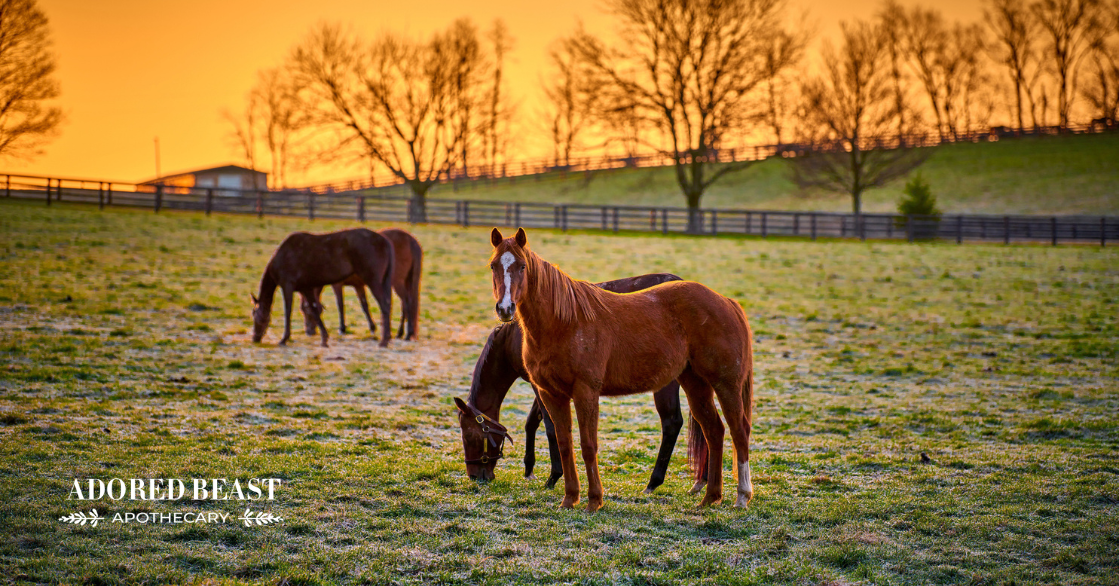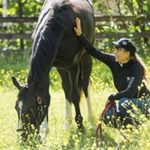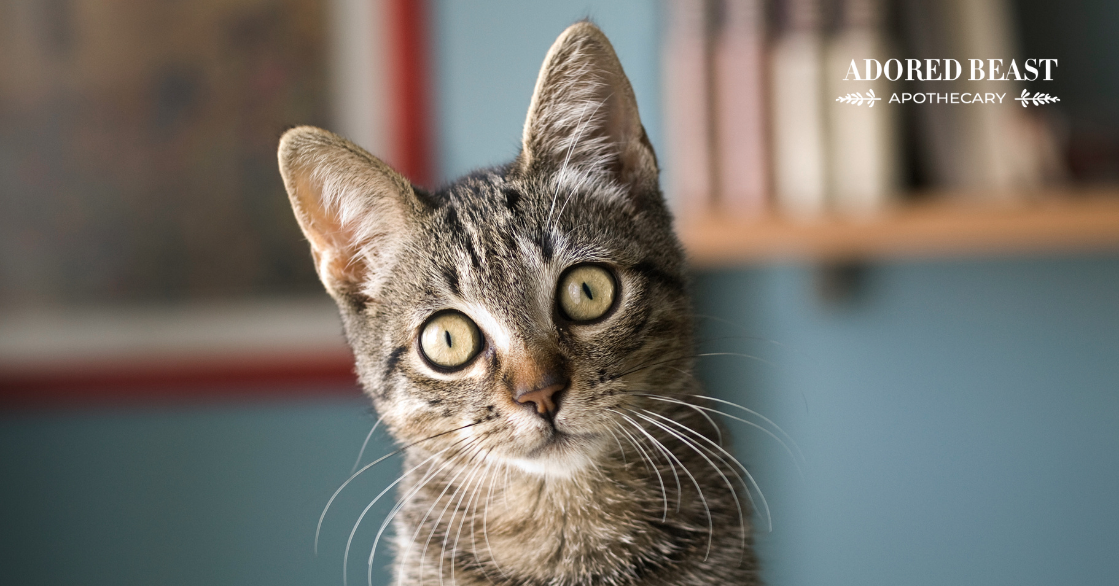Stress management for horses – now here’s a topic I’m very passionate about! After a lifetime with horses, I’ve seen it all (or close to it). My process of understanding animal health requires a method of reverse engineering to figure out what makes them sick instead of just looking at disease as a random event.
To understand how disease develops, I look at the ancestry of the animal and the most common modern disease processes that affect them. I research the science that suggests the cause of these diseases and compare that to their ancestry to find clues to where I might find solutions and preventative methods. To understand stress, and therefore stress management for horses, it only makes sense to explore factors that increase the stress hormones cortisol and adrenaline and increase in serum inflammatory immune markers.
The most common equine pathologies all have epigenetic components to them, meaning that the cause has less to do with genetics and more to do with the environment that the animal is living in. Environmental stress comes in many forms including housing, footing, bedding, diet, exercise, climate, stress levels and more.
My priorities with my own horses have changed dramatically over the years. The focus has become entirely about their quality of life and very little on my personal equestrian goals. There are many ways a horse can experience stress on physical and emotional levels. It is a major contributing factor to disease in all species of animals. Today, I want to dive into the top 5 subjects that we can look at to reduce stress for our horses.
Common Equine Diseases
Which chronic diseases are the most prevalent in horses today?
- Colic and ulcers
- Insulin resistance and laminitis
- Inflammatory conditions eg. asthma and arthritis
We can look into the research surrounding these diseases to find clues as to the causes – and stress is right up there. Physical and emotional stress have been scientifically proven to change metabolism and increase immune-mediated inflammatory markers in the blood. That’s why I want to dedicate some time specifically to talk about this topic.
Stress Management for Horses
Let’s focus on how we can help our horses be more comfortable in their environment with these categories and 5 important tips stress management for horses.
1. Nutritional Stress
Food plays a major role in the development – and therefore management – of stress in horses. There are many types of nutritional stress, the most common being:
a) nutritional deficiency
b) highly processed feeds
c) lack of access to varied fibre
Solutions:
To determine if your horse has any nutritional deficiencies, you can use a combination of methods. First, be sure that you can obtain a hay analysis from your hay supplier to get a baseline for what your horse is getting. If you’re not sure how to read a hay analysis, you can check out my article here for help. Secondly, it is helpful to have blood testing done to explore your horse’s mineral levels and, if there are any specific health concerns, vitamin testing may apply (eg. vitamin Bs, E, and more). You can ask your veterinarian to run these tests. Mineral testing is inexpensive and well-worth it. Then you can supplement as needed. If you’re not sure what supplementation is best, work with a professional equine nutritionist.
Highly processed feeds can wreak havoc on a horse. Research proves that high starch drastically alters the gut microbiome of horses and causes a higher production of valeric acid (1) which is shown to lead to ulcer formation (2). Highly processed foods should be avoided for the prevention of gut disease in horses. Gut disease is well-researched to be a catalyst for systemic inflammatory diseases, metabolic dysregulation, and much more.
Additionally, processed feeds contain crops from the conventional agriculture industry (GMO crops) that are sprayed heavily with herbicides and pesticides including glyphosate, dicamba, and others. Glyphosate is a proven metabolic deregulator, a patented antibiotic, and is suspected of being a cancer-causing agent. The top GMO crops fed to horses are: wheat, corn, soy, sugar beets and alfalfa. Avoid these!
And the last point against processed feeds: grains and legumes can house aflatoxins which are a chemical by-product of dangerous mold formation on improperly cured crops. Aflatoxins are poisonous to horses and can result in liver damage and inflammatory disease (3).
Lack of fibre in the equine diet is probably one of the most under-rated issues in the equine health. Providing healthy fibre to your horse is more than just adding a processed feed that indicates that it has fibre in it! Fibre comes in many forms in the ancestral equine diet – from hay and bark to herbs and roots – and varies throughout the seasons. One of the most dire issues in equine health today is the lack of fibre that horses have in conventional feeing programs. The less access to varied fibre, the more risk of metabolic dysregulation (4) and inflammatory disease (5).
2. Physical Stress
Physical stress is another important area to consider when it comes to stress management for horses. This type of stress comes in many forms:
- lack of bedding, leading to poor sleep quality and body soreness
- poor footing – including wet, slippery, hard, or rough ground
- excessive exercise and repetitive movement
- unresolved inflammation or illness
- injury
- poor farriery
- stagnation of movement
- surgery and medications
Solutions: Be honest in terms of how your horse might be feeling in these areas. If you see places you can improve on even one of these areas, do it. Be sure your horse is comfortable in their body. If you think something doesn’t feel right, listen to that feeling. No matter how much it costs now, it is no measure as to how much it will cost you both in stress and money later if you let things go unresolved.
- Provide soft, deep bedding for your horse to sleep on. Keep the dust down.
- Assess the footing in living spaces.
- Assess your horse’s fitness level and don’t push them over their threshold.
- Make exercise varied and appropriate for your horse’s fitness level and age.
- Listen when your horse is saying no to something – they are telling you important information!
- Take care of injuries immediately and give as much time as possible for full recovery.
- Be sure that your farrier is balancing your horse’s feet correctly. Get x-rays if you aren’t sure.
- Get your horse moving as much as possible to increase blood flow and oxygenation to all the body tissues.
- Have a bodyworker such as a massage therapist, chiropractor, or osteopath work on your horse regularly.
- Be minimal when it comes to medications wherever possible, especially with NSAID and antibiotic drugs.
3. Mental Stress
In order to understand what stresses our horses out, we need to use our intuitive and empathic abilities to see things from their point of view. Research shows that the following factors can be highly stressful for horses and can affect their immune system, gastrointestinal system, and metabolic function:
We also need to go beyond scientific studies and see the horse that is in front of us. Tune into your horse and listen to what they need. Signs your horse might be stressed include:
- chronic behavioural issues (spooking, rearing, kicking, biting, etc.)
- changes in behaviour
- new environments or change to the environment
- social stress (eg. bullying between herd members, herd-bound behaviour or lack of social time)
- if you’re stressed, take note. Our stress affects our horses too! Check out the video on the research being conducted at the Heartmath Institute on this very subject by following this link.
Solutions:
- Be sure to practice trailering with your horse in small pieces and not just before you have to take them somewhere. If you know your horse has stress with loading or traveling, do the work to get them comfortable with this process. It can literally be life-saving.
- Be kind in training. Assess your horse’s fitness level. Adjust training to a small daily challenge rather that rigorous and repetitive training. Less is more! Vary your training lessons and spend time grazing your horse, doing groundwork and hacking out on trails.
- Do not give your horse challenges that they cannot meet. It will erode your relationship and their trust in you. Break things up in to learnable pieces and make it fun if you can.
- Do tons of groundwork! Build your relationship with your horse so they are tuned into you and trust you in stressful situations. Ensure that you are clear on safe and healthy boundaries so your horse knows clearly what is being asked of him. If you’re unclear, it can be very stressful. Think of this in terms of human relationships too!
- Address any negative stress-related behaviours with a professional if you can’t handle them yourself – help to resolve the reason when your horse is exhibiting fight or flight (AKA stress) behaviours.
- If your horse is finding something mentally challenging, pay attention. Slow down and figure out what they need.
- Give your horse as much space as possible to promote movement.
- Figure out a social situation that works for your horse so they can have interactions with other horses.
- If you plan on moving your horse to a new location or a horse show, prep for stress reduction – check out our homeopathy for horses and our show prep articles for tips on this subject. Nutrients like magnesium, vitamin C and E are also indicated for reducing stress.
- Provide as much turnout or grazing time as you can – it will be different for each horse but it’s always important to provide it either in-hand or in the field. Check out our Turn Your Horses Out article for more research on why it’s so important.
- Spend time with your horse that doesn’t involve constant pressure. Make time to enjoy each other without expectations.
- Practice self-awareness to ensure that your emotional stress is not affecting your relationship with your horse. Accountability is important and so is your mental health!
4. Gut Stress
Did you know that the gut health is interconnected with brain function? Did you know that poor gut health can lead to increases in anxiety and depression in multiple species, including horses? (16) It can also lead to colic and laminitis – remember those common diseases mentioned at the beginning of this article? (17)
Factors that influence gut health include:
- diet – high starch, low fibre (16)
- sporting (16)
- overstocking of living spaces (16)
- stagnation (lack of movement)
- medications (eg. NSAIDs and antibiotics) (18) (19)
- chronic emotional stress
Solutions:
- Be meticulous about assessing your horse’s diet, especially fibre and starch levels.
- Provide a multi-strain, species-appropriate probiotic.
- Provide as many prebiotic fibres as humanly possible.
- If your horse has a history of ulcers, consider gut-reparative herbs and nutraceuticals including marshmallow root, liquorice root, slipper elm bark, aloe vera, and L-glutamine.
- Ensure that your horse is eating most of his waking hours! Lack of forage intake can lead to acid-buildup and gastric ulcer formation, especially exercising on an empty stomach.
- Ensure your horse is moving around as much as possible, not just with exercise but also with foraging behaviour and the low-impact movement of walking.
- Avoid antibiotics whenever possible – only use when extremely necessary! Think of the risks vs. the benefits when deciding if they are warranted.
- Avoid NSAID drugs wherever possible as they are well-document to promote ulcer formation.
- For tips on ulcer prevention, check out our blog here.
- For even more gut health tips, check out our gut restoration article.
5. Sleep Stress
As we all know, sleep is imperative for regenerating our entire body and reducing stress. This can be a serious concern for modern horses who are living in synthetic environments. Lack of sleep increases the stress hormone cortisol (13) and increases risk for anxiety, depression, cardiovascular and metabolic diseases (20).
Factors the affect sleep:
- inadequate bedding
- chronic pain
- environmental discomfort eg. noise, light exposure
- perceived safety
- light exposure
Solutions:
- Bedding quality and quantity – the quality of their bedding will drastically change their sleeping behaviour so make sure you’re taking this seriously (21) (20).
- If you suspect your horse has chronic pain, take measures to get them comfortable. There are many natural solutions to chronic pain as well as conventional pain management if it is warranted for quality of life.
- Be sure that your horse’s evenings and nights are quiet and non-disruptive after the lights go out.
- Be sure your horse feels safe in their environment as this can seriously affect their ability to have proper REM sleep (if they are starting awake constantly).
- Be sure there is lots of natural light coming into your horse’s sleeping area so their circadian rhythm can sync with daylight hours.
Managing (and reducing whenever possible) stress is so critical for overall health and wellness, not just for our animals, but for ourselves as well. Stress management for horses is essential, and these tips will help you eliminate many of the stress-inducing factors in your equine’s world, leading to better health overall!
References
- BMC Veterinary Research: A high-starch vs. high-fibre diet: effects on the gut environment of the different intestinal compartments of the horse digestive tract, 2022
- American Journal of Veterinary Research: Effects of hydrochloric, valeric, and other volatile fatty acids on the pathogenesis of ulcers in the non-glandular portion of the stomach of horses, 2003
- The Veterinary Journal: Toxicological effects of aflatoxins in horses, 2011
- Horse Production: Carbohydrate metabolism and metabolic disorders in horses, 2009
- BMC Veterinary Research: Gut health of horses: effects of high fibre vs. high starch diet on histological and morphometrical parameters, 2022
- Nature: Inflammatory-like status and acute stress response in horses after road transport, 2023
- Journal of Animal Science: Effect of transport on fecal bacterial communities and fermentative activities in horses: Impact of S. cerevisiae CNCM I – 1077 supplementation, 2013
- Research in Veterinary Science: Effect of transportation on the sympatho-adrenal system responses in horses, 2019
- Animal Physiology and Animal Nutrition: Effects of competition on acute phase proteins and lymphocyte subpopulations – oxidative stress markers in eventing horses, 2015
- Vetrinar: Indicators of exhaustion and stress markers in endurance horses, 2021
- Department of Large Animal Diseases and Clinic: Intense leisure exploitation influences on horses hormonal reaction – preliminary study, 2022
- Journal of Equine Veterinary Science: Relationship of some oxidative stress biomarkers in jumper horses after regular training program, 2016
- Animals: Do you think I am living well? A four-season hair cortisol analysis on leisure horses in different housing and management conditions, 2021
- Applied Animal Behaviour Science: Behavioural and physiological responses of horses to initial training: the comparison between pastured versus stalled horses, 2022
- Equine Veterinary Journal: Comparison of bone mineral content and biochemical markers of bone metabolism in stall vs. pasture-reared horses, 2010
- The Horse: Horse behaviour and the microbiome: what’s the connection? 2023
- Journal of Equine Veterinary Science: Factors influencing equine gut microbiota: current knowledge, 2020
- Journal of Equine Veterinary Science: Prognostic significance of oxidative stress markers in colitis associated with Phenylbutazone administration in draft horses, 2012
- Texas A&M University Libraries: The equine fecal microbiome – effects of diet, antimicrobials and colitis, 2020
- Frontiers in Veterinary Science: A review of equine sleep: implications for equine welfare, 2022
- British Society of Animal Science: The effects of night light and bedding depth on equine sleep duration and memory consolidation, 2020











![[RESEARCH] Is Herbicide Safe for Dogs?](https://blog.adoredbeast.com/wp-content/uploads/2025/06/herbicides-safe-for-dogs-103x55.png)
